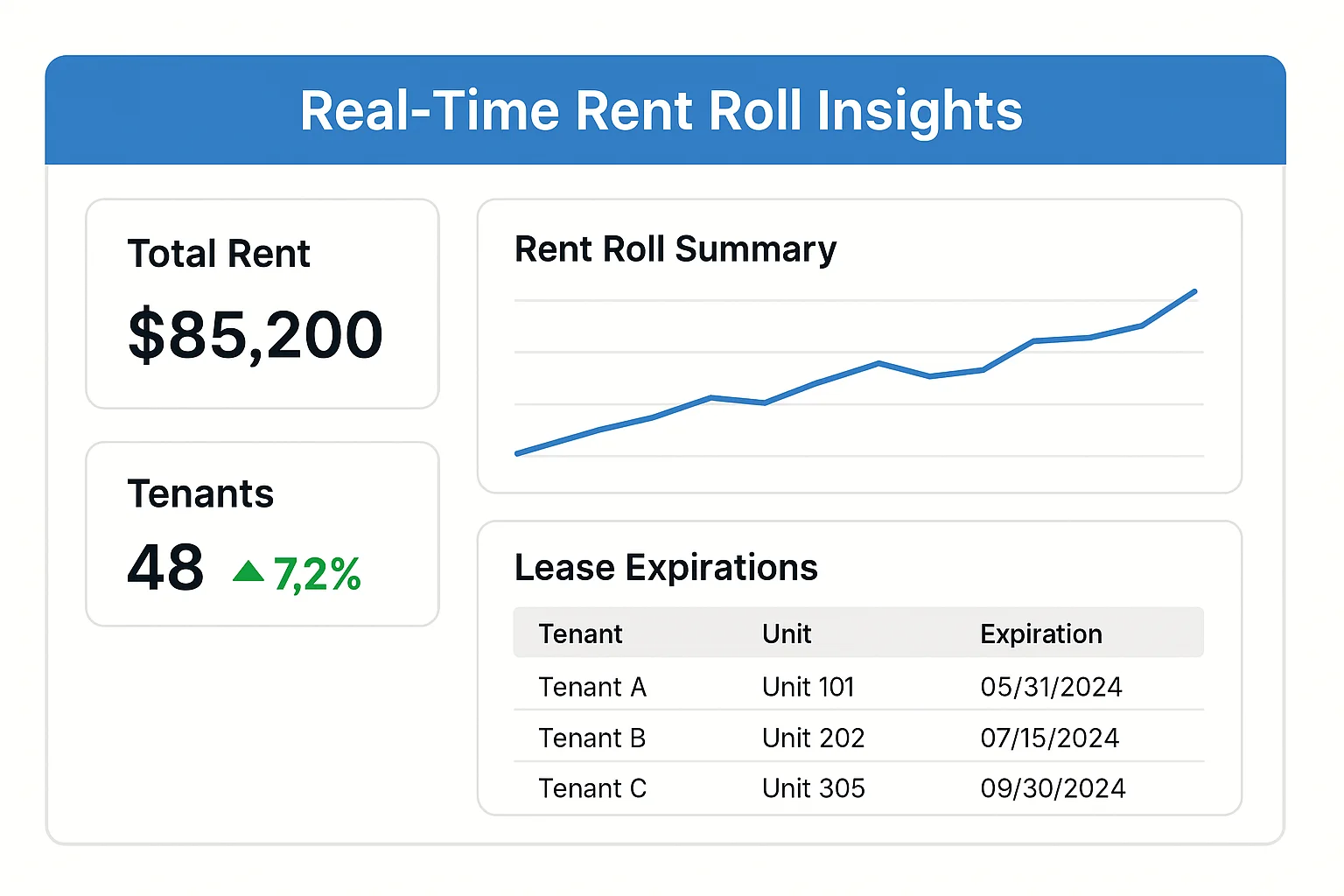Managing rent rolls is one of the most essential but tedious responsibilities in property management. A rent roll provides a comprehensive snapshot of income-producing units in a property or portfolio—listing tenants, lease terms, rental amounts, and payment status. For landlords, asset managers, and real estate investors, maintaining an accurate rent roll is critical for decision-making and financial forecasting. Yet when done manually, the process is error-prone and time-intensive. This is where rent roll software comes into play, offering automation, accuracy, and scalability.
This article is part of a comprehensive series on Rent Roll.
What Is Rent Roll Software?
Rent roll software is a digital solution designed to automate the creation, updating, and analysis of rent rolls. Instead of relying on static spreadsheets that require manual updates, software platforms can integrate with lease documents, accounting systems, and property management tools to deliver real-time insights. At its core, rent roll software organizes tenant data into a dynamic ledger that evolves with the property’s operations.
The best systems don’t just record rent—they contextualize it. For example, a software-generated rent roll might include not only current tenant obligations but also upcoming lease expirations, delinquency risk scores, and projected revenue under different occupancy scenarios. This transforms the rent roll from a static report into a decision-support tool.
Why Rent Roll Software Matters for Property Managers
Accuracy in rent rolls affects nearly every aspect of property management. When tenant information is scattered across files or spreadsheets, discrepancies can creep in—missed rent increases, overlooked lease expirations, or incorrect payment tracking. These errors can lead to lost revenue, strained tenant relationships, and compliance risks.
By contrast, rent roll software provides a centralized source of truth. With automation, every new lease, amendment, or payment is reflected instantly, eliminating the lag between changes and reporting. Property managers gain not only confidence in their numbers but also more time to focus on strategic activities like tenant retention and portfolio growth.
Core Features of Rent Roll Software
Most rent roll platforms offer similar baseline functionality, but the most effective solutions go further by embedding intelligence and automation. Common features include:
- Automated Data Entry: Software extracts lease details and populates fields without manual input.
- Integration with Accounting Systems: Ensures that rental income and expenses align across ledgers.
- Forecasting Tools: Provides forward-looking insights into occupancy and revenue trends.
- Customizable Reports: Allows users to generate rent rolls tailored to investors, lenders, or internal teams.
Advanced solutions incorporate AI and natural language processing (NLP) to extract terms directly from lease agreements. This not only accelerates data entry but also reduces the risk of human error—a crucial advancement for large portfolios.
Rent Roll Software in Action
Consider a mid-sized multifamily operator managing 500 units across several properties. Without software, maintaining rent rolls requires constant manual reconciliation between leases, spreadsheets, and accounting systems. Every renewal, every rent escalation, and every late payment has to be entered by hand, introducing the risk of oversight.
With rent roll software, the same operator can centralize all data. When a lease is signed, the software automatically extracts key terms and updates the rent roll. Payments are synced with the accounting system, and delinquency alerts are generated in real time. Reporting that once took hours can now be completed in minutes, ready for presentation to lenders, partners, or investors.

The Role of AI in Modern Rent Roll Software
Artificial intelligence is redefining the capabilities of rent roll management. Instead of functioning as simple recordkeeping systems, AI-enhanced platforms act as intelligent assistants. They can flag anomalies such as a rent payment that deviates from the lease terms, or highlight units at risk of vacancy based on tenant behavior.
Kolena, for example, has demonstrated how AI agents can automate data extraction from lease documents, reconcile financial information, and even perform scenario analysis. This represents a shift from reactive management to proactive strategy. By adopting AI-powered rent roll software, real estate teams can anticipate challenges before they arise and make data-driven decisions with confidence.
How Kolena Fits into Rent Roll Automation
Kolena’s platform allows property managers and asset owners to build custom AI agents that handle rent roll creation and upkeep without coding. By ingesting lease documents, utility bills, and payment records, Kolena’s agents can automatically generate rent rolls, cross-verify figures with accounting systems, and produce tailored reports.
For firms managing multiple properties, this automation eliminates redundant tasks while ensuring accuracy. Instead of combing through hundreds of documents, teams can rely on Kolena to deliver consistent, verifiable results. With natural language commands, even non-technical staff can instruct the system to “summarize all upcoming lease expirations” or “flag tenants behind on rent.” This no-code flexibility makes advanced automation accessible across an organization.
Try Kolena’s free AI-powered rent roll spreadsheet generator.
Looking Ahead: The Future of Rent Roll Software
The evolution of rent roll software mirrors broader trends in real estate technology. As portfolios expand and data volumes grow, static spreadsheets are no longer viable. Instead, dynamic, AI-driven systems will dominate, offering predictive analytics, integration with smart building data, and real-time collaboration with lenders and investors.
In the near future, property managers can expect rent roll software to not only track revenue but also model its impact on asset valuation, financing options, and investment strategies. By bridging operational data with strategic decision-making, rent roll platforms will become indispensable for competitive property management.
Conclusion
Rent roll software is more than a convenience—it is a critical tool for accuracy, efficiency, and strategic growth in property management. By automating manual processes, integrating with financial systems, and embedding AI intelligence, modern platforms empower managers to focus on maximizing portfolio performance.
For organizations ready to modernize their workflows, Kolena provides the tools to transition from spreadsheets to intelligent rent roll management. By adopting AI-powered solutions, property managers can save time, reduce errors, and gain a competitive edge in an increasingly data-driven market.